Turritellidae
Turritellidae, common name the "tower shells" or "tower snails", is a taxonomic family of small to medium-sized sea snails, marine gastropod molluscs in the clade Sorbeoconcha.
| Turritellidae | |
|---|---|
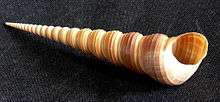 | |
| A shell of a Turritella species | |
| Scientific classification | |
| Kingdom: | Animalia |
| Phylum: | Mollusca |
| Class: | Gastropoda |
| Clade: | Caenogastropoda |
| Clade: | Sorbeoconcha |
| Superfamily: | Cerithioidea |
| Family: | Turritellidae Lovén, 1847 |
| Genera | |
|
See text | |
| Diversity[1] | |
| 21 extant genera 125 extant species | |
| Synonyms | |
| |
These snails are filter feeders. This method of feeding is somewhat unusual among gastropod mollusks, but is very common in bivalves.
Shell description
The shells of turritellid species have whorls that are more convex and an aperture which is more circular than it is in the auger shells which are similarly high-spired. The columella is curved and the thin operculum is horny.
Anatomy of the soft parts
These snails burrow into mud or sand. The foot is relatively small.
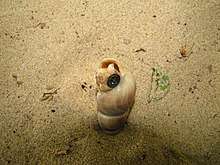
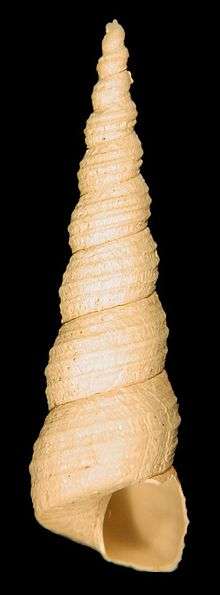
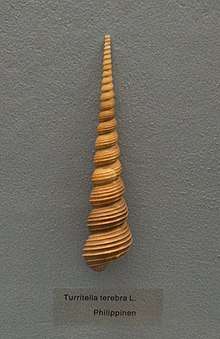
Taxonomy
The following five subfamilies were recognized in the taxonomy of Bouchet & Rocroi (2005):
- Turritellinae Lovén, 1847 - synonyms: Zariinae Gray, 1850; Zeacolpini Marwick, 1971; Archimediellidae Starobogatov, 1982; Tachyrhynchinae Golikov, 1986
- Orectospirinae Habe, 1955
- Pareorinae Finlay & Marwick, 1937
- Protominae Marwick, 1957
- Vermiculariinae Dall, 1913 - synonym: Pseudomesaliidae mahmoud, 1955 (inv.)
Genera
Genera within the family Turritellidae include:
- Turritellinae
- Archimediella Sacco, 1895
- Banzarecolpus Powell, 1957
- Colpospira Donald, 1900
- Gazameda Iredale, 1924
- Glyptozaria Iredale, 1924
- Incatella DeVries, 2007[2]
- Maoricolpus Finlay, 1927
- Spirocolpus Finlay, 1927
- Stiracolpus Finlay, 1926
- Tachyrhynchus Mörch, 1868
- Turritella Lamarck, 1799 - the type genus of the family, synonyms: Torcula Gray, 1847; Proto Blainville, 1824
- Zeacolpus Finlay, 1927
- Zaria Gray, 1842: synonym of Turritella Lamarck, 1799
- Orectospirinae
- Orectospira Dall, 1925
- Pareorinae
- † Batillona Finlay, 1927
- Pareora Marwick, 1931
- Protominae
- Protoma Baird, 1870 -( synonym: Protomella Thiele, 1929)
- Vermiculariinae
- Callostracum E. A. Smith, 1909
- Vermicularia Lamarck, 1799
family ?
- Armatus Golikov, 1986[4]
- † Colposigma Finlay & Marwick, 1937[5]
- Mesalia Gray, 1847[6]
- Neohaustator Ida, 1952[7]
- † Palmerella Allmon 1996[8]
- † Tropicolpus Marwick, 1931[9]
Palaeontological locations
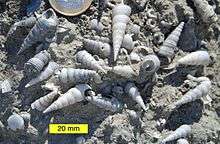
- The Turritellenplatte of Ermingen ("Erminger Turritellenplatte" near Ulm, Germany) is situated in the northern part of the North Alpine Foreland Basin (NAFB) and is famous for its abundance of Turritella turris gastropod shells within sedimentary deposits. The fauna of this gastropod-rich sandstone reflects mainly near-coastal and shallow marine conditions.[10] Petrographical and palaeontological data allow a correlation of Turritellenplatte of Ermingen with Burdigalian (Lower Miocene). Sr-isotope composition of shark teeth suggests an age of about 18,5 Ma for the Turritellenplatte of Ermingen.[11]
References
- Strong E. E., Colgan D. J., Healy J. M., Lydeard C., Ponder W. F. & Glaubrecht M. (2011). "Phylogeny of the gastropod superfamily Cerithioidea using morphology and molecules". Zoological Journal of the Linnean Society 162(1): 43-89. doi:10.1111/j.1096-3642.2010.00670.x.
- DeVries T. J. (2007). "Cenozoic Turritellidae (Gastropoda) from southern Peru". Journal of Paleontology 81(2): 331-351. doi:10.1666/0022-3360(2007)81[331:CTGFSP]2.0.CO;2.
- Harzhauser M. (2007). "Oligocene and Aquitanian gastropod faunas from the Sultanate of Oman and their biogeographic implications for the western Indo-Pacific". Palaeontographica Abteilung A 280: 75-121. PDF.
- Vos, C.; Bouchet, P. (2014). Armatus Golikov, 1986. In: MolluscaBase (2017). Accessed through: World Register of Marine Species at http://marinespecies.org/aphia.php?p=taxdetails&id=575786 on 2017-11-17
- Marshall, B. (2017). Colposigma Finlay & Marwick, 1937 †. In: MolluscaBase (2017). Accessed through: World Register of Marine Species at http://www.marinespecies.org/aphia.php/aphia.php?p=taxdetails&id=828132 on 2017-11-17
- Vos, C.; Bouchet, P.; Gofas, S. (2013). Mesalia Gray, 1847. In: MolluscaBase (2017). Accessed through: World Register of Marine Species at http://www.marinespecies.org/aphia.php?p=taxdetails&id=138613 on 2017-11-17
- Bouchet, P. (2011). Neohaustator Ida, 1952. In: MolluscaBase (2017). Accessed through: World Register of Marine Species at http://www.marinespecies.org/aphia.php?p=taxdetails&id=575807 on 2017-11-17
- Halder, K., & Sinha, P. (2014). "Some Eocene Cerithioids (Gastropoda, Mollusca) from Kutch, Western India, and Their Bearing on Palaeobiogeography of the Indian Subcontinent". Paleontology Journal, 2014, Article ID 673469, doi:10.1155/2014/673469.
- Marshall, B. (2017). Tropicolpus. In: MolluscaBase (2017). Accessed through: World Register of Marine Species at http://www.marinespecies.org/aphia.php?p=taxdetails&id=828134 on 2017-11-17
- Baier J. (2008). "Über die Tertiärbildungen im Ulmer Raum". Documenta Naturae 168: 1-32. München. ISBN 978-3-86544-168-3.
- Baier J. (2008). "Ein Beitrag zur Erminger Turritellenplatte (Mittlere Schwäbische Alb, SW-Deutschland)". Jahresbericht Mitt. oberrhein. geol. Ver., N.F. 90: 9-17. Stuttgart, ISSN 0078-2947.
Further reading
- Mayr H. (1985). A Guide to Fossils. Princeton University Press, Princeton, New Jersey, USA. (English translation 1992).
- Powell A. W. B. (1979). New Zealand Mollusca, William Collins Publishers Ltd, Auckland, New Zealand, ISBN 0-00-216906-1.
- Kiel S. (2003) New taxonomic data for the gastropod fauna of the Umzamba Formation (Santonian–Campanian, South Africa); Cretaceous Research 24 (2003) 449–475
External links
| Wikimedia Commons has media related to Turritellidae. |
- "Turritellidae". Integrated Taxonomic Information System.
- Selachian fauna of Turritellenplatte: Abstract of Baier et al. 2004
- Age and Sedimentpetrography of Turritellenplatte: Abstract of Baier 2008
- Turritelidae species database
- Miocene Gastropods and Biostratigraphy of the Kern River Area, California; United States Geological Survey Professional Paper 642
